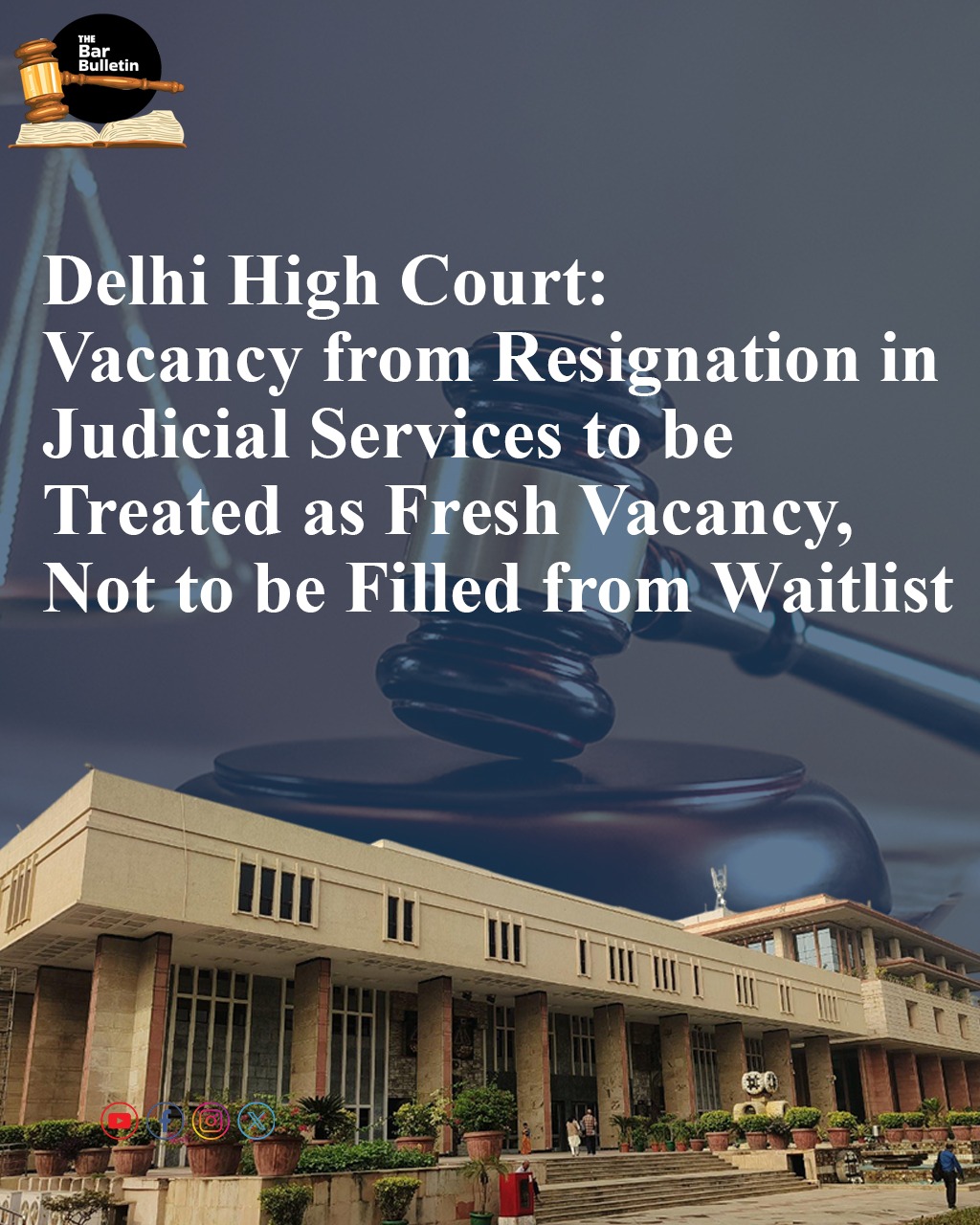The Delhi High Court has dismissed a writ petition which sought to invoke the extraordinary jurisdiction of the court to seek the appointment on the seat, which had fallen vacant after resignation of an appointee of the Delhi Judicial Services Examination, 2022, in accordance with Rule 18 (vii) of Delhi Judicial Services Rules, 1970. The Court observed that the petition was devoid of any merit and that the petitioner was not entitled to be appointed against the vacancy arising out of resignation of a selected candidate who had duly joined the service as that vacancy was to be treated as a fresh vacancy, and could not be filled up without issuing a fresh advertisement and conducting a fresh selection process.
The petitioner contended that, being next in the waitlist, she was entitled to appointment against the vacancy arising from a selected candidate in the Delhi Judicial Services resignation, as the purpose of a waiting list was to fill vacancies caused by non-joining or resignation during the training period with the next candidate in order of merit. She submitted that there was no express bar in the Delhi Judicial Services Rules, 1970, for such appointments and, in the absence of clear provisions, she should get the benefit of the ambiguity. She further argued that Ms. Riya Goyal had wrongly joined by concealing her Punjab Judicial Services appointment, making her appointment void ab initio. The petitioner relied on Sujal Gautam. v. Union of India[1]., which held that “Vacancies resulting from resignation or death within one year of appointment should be filled from the reserve panel… Such a vacancy should not be treated as a fresh vacancy.”
The respondent countered that, under Rule 18(vi), a waitlisted candidate can be appointed only if a selected candidate fails to join within the stipulated time, not upon resignation after joining. It was claimed that there was no provision in Delhi Judicial Services, 1970, which entitles the next in-line candidate, according to the select list, to get appointed where the vacancy was created on account of subsequent resignation of a selected candidate. Relying on Rakhi Ray v. High Court of Delhi[2] and Sudesh Kumar Goyal v. The State of[3] , it was submitted that the Supreme Court clarified that any vacancies arising out of resignation of one of the selected candidates does not gave rise to a fresh vacancy.
The Court observed that rule 18 and its sub-clauses led one to understand that these rules predominantly related to joining of a candidate and prescribing different time periods during which they might be allowed to join and did not take into account the various facets which might arise after joining. Thus, these rules, according to the Court, only recognised one type of vacancy, which was by virtue of a failure to join as enshrined under rule 18(v), and did not recognise any other kind of vacancies. The Court noted that since all the 88 seats candidates recommended under the unreserved category came to join, there was no vacant seat available to accommodate the petitioner in terms of rule 18(vi) of the Delhi Judicial Services Rules. The Court further observed that according to the established principle in the Sudesh Kumar case if all the vacancies initially stood filled and subsequently one or more of the selected candidates tendered their resignation after duly joining the service, then such vacancies would be treated as fresh vacancies which could not be filled up without issuing a proper advertisement and following the due process for the upcoming selection.
The Division Bench of Justice Om Prakash Shukla and Justice C. Hari Shankar held that the present petition deserved to be dismissed as the petitioner was not legally entitled to be appointed against the vacancy arising out of the resignation of Ms. Riya Goyal as per the existing Delhi Judicial Services Rules, 1970. The Court found that there appeared to be a dichotomy in the rules, which could only be cured by the rule makers or the competent committee of this Court on the administrative side. This Court purposefully did not enter into the arena of the misconduct alleged against the selected candidate in concealing the material fact relating to her appointment in the Punjab Judicial Services as the same was not under challenge in this writ petition and directed that this judgment be placed before the Rules Committee for reconsideration of appointment rules.
[1] 2022 SCC OnLine Del 1850
[2] 2 (2010) 2 SCC 637
[3] 3(2023) 10 SCC 54
Appearances:
Petitioner: Mr. J Sai Deepak, Sr. Adv. with Mr. Abhinav Garg, Mr. Abhishek Kumar, Mr. Luv Kumar and Mr. Manwendra Gautam, Advs.
Respondents: Mr. Siddharth Thakur and Mr. Apurv Gaur, Advs.
![]()

